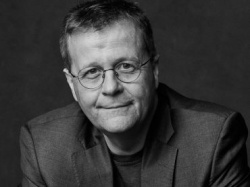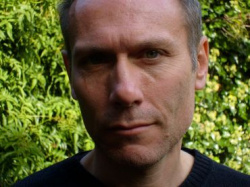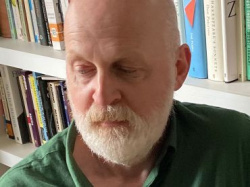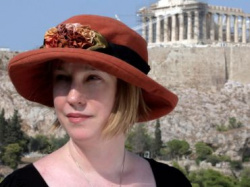Who follows Alice Oswald? Four candidates set out stalls to become Oxford Professor of Poetry

Four candidates have thrown their hats in the ring to succeed Alice Oswald, pictured left, as the next Oxford Professor of Poetry. They are Christian Bök, Mark Ford, Don Paterson and AE Stallings. Members of Convocation will elect the next professor on 16 June. Professor Marion Turner, chair of the English faculty board, has said: “For many people from all walks of life, reading, hearing, and thinking about poetry is of profound importance. The prestigious Professorship of Poetry celebrates the role that poetry has held in almost all societies. It is a flagship post at Oxford, and represents our commitment to discussing the craft of poetry, its practice, interpretation, and power.”
Convocation consists of all the former student members of the University who have been admitted to a degree (other than an honorary degree) of the University, and of any other persons who are members of Congregation or who have retired having been members of Congregation on the date of their retirement. Members of Convocation who wish to vote must register their intention by 12 May. Registered voters will be able to vote online from 18 May to noon on 15 June 2023.

“With more than 30 years of experience, addressing schools all around the world (promoting poetry from every continent, including, among other forms: Japanese haibun, Persian ghazals, Balinese ketjacks, and Russian zaum), I expect to fulfill my duties by keeping this persistent durability of poetry in mind, discussing an inclusive, equitable selection of perspectives across time in genres both conventional and experimental. If appointed, I foresee collaborating with my peers in the college to transect boundaries between disciplines, addressing topics that might demonstrate the aptness of poetry to other fields of study (particularly in the domain of natural science, where I have learned skills required to write poems that can literally transform the behaviour of living things). I can deliver talks that invite engagement from areas outside the humanities, thereby highlighting the appeal of poetry to everyone.
“I have dedicated my career to the study of ‘limitcases’ in the history of poetry, writing lyric poems in books made from materials as varied as Lego tiles, Rubik’s cubes, QR codes, AI chats, and DNA genes — often using the tools of scientific technology to escort poetry into the 21st century. I look forward to mentoring students from all walks of life during this professorship, offering my time openly to young poets, helping them to foster their talent so that they might thrive in their careers.”

“On learning that I had been shortlisted for this post, I at once found myself considering the sorts of lecture I would like to give: provisional titles that came to mind ranged from ‘It Is Later Than You Think: Poetry and Threat’ to ‘Langston Hughes, Derek Walcott, and the Deep South’; from ‘Queer Pastoral: Gerard Manley Hopkins and AE Housman’ to ‘The Smile of Accomplishment: Self-Elegies from Christina Rossetti to Sylvia Plath’. I am especially interested in elegiac traditions, having just completed a book on Thomas Hardy’s poems about his wife Emma. I am keen to expand this research and would use these lectures to address poetic commemorations of the dead by such as Elizabeth Bishop, Adrienne Rich, Denise Riley, Mick Imlah, Kei Miller, Jay Bernard, and Caleb Femi.
“As a regular contributor to the London Review of Books and the New York Review of Books, I am experienced at presenting sophisticated critical arguments to a wide readership. I think of myself as at once a poet-critic in the tradition of Eliot and as a literary historian of British, American, and French poetry from 1800 to the present day. My publications include four collections of poetry, three volumes of essays (the most recent of which, This Dialogue of One: Essays on Poets from John Donne to Joan Murray, won the Poetry Foundation’s 2015 Pegasus Award for Poetry Criticism), and monographs on Raymond Roussel and Thomas Hardy. Admirers of my own poetry include Helen Vendler, Marjorie Perloff, John Ashbery, Peter Gizzi, Daljit Nagra, and Sarah Howe.”

“Are all these verbal arts still part of the same word-game we call ‘poetry’? Do we still share a working definition of talent, skill and inventiveness, of a tradition which fosters and embodies them? Should these older values maintain their primacy, or must they adapt to the more immediate claims of identity, inclusion and social conscience? Is the poetry of lived experience compatible with a poetry of the imagination? Is still true to claim that a poet is just ‘one skilled in the making of verses’, and that poems ‘begin in delight and end in wisdom’?
“Computers fast became an indispensable tool in music, without shaking the foundations of our notions of musical creativity and value. Will poetry survive the only serious technological change it has faced since Gutenberg, namely AI? Contemporary poetry may soon discover that it is only too easily imitable: where will this leave our virtues of originality, unique authorship, authenticity? Should poets be thinking like musicians, of ways new tech and AI might help them write better poems?
“The professorship would allow me to address these questions through both lecture and public event – as well as the opportunity, I confess, to explore my own current obsessions: how a newly resurgent metropolitanism may be fuelling a regional poetry of ‘alternative Englishes’ and of the UK’s various national and ethnic identities; the shamefully neglected ‘loner’ women poets of the mid-20th century (rehabilitations still tend to focus on women associated with male-centred schools); the complex prosody of hiphop and rap; Seamus Heaney’s little-imitated use of deep etymologies; and new insights from the field of cognitive poetics. I’ve written both technical monographs and books of ‘popular literary criticism’, and defended the latter as an alternative home for academic research; I have some experience in making new or esoteric ideas accessible to the much-maligned ‘general reader’ in whom I continue to place my faith. In a time of accelerating change, the professorship would offer a rare still moment in which to take stock of the past, assess the present cultural status and ‘use’ of the poem, and look to where it might be headed – as well as what it may yet achieve.”

“As a reviewer, I have written on modern American, English, Canadian, Greek, Irish, and Afro-Caribbean poets. As a blogger, I have addressed 'sonnetude', Afro-formalism, the business of blurbs, neo-formalism and the avant-garde. I’ve also written expansive essays on literary shipwreck, on refugees in Aegean literature, on statues and ruin, and on poets and the Parthenon. Collaboration with the Faculties of English and Classics is certain to help me generate new themes during my tenure.
“I enjoy teaching, and have served as faculty at US writers’ conferences including Sewanee, Bread Loaf, West Chester, and Poetry by the Sea. For ten years I directed a workshop through the Athens Centre focused on form and generating new poems. Since 2016 I have run a weekly workshop in Athens with refugee women from Afghanistan, Iraq, Syria, Iran, Ukraine, and Congo (DRC) at the Melissa Network for Migrant Women. Our emphasis isn’t only on war and the harrowing journey, but on the future, their authorship of their own stories. I would hope to collaborate productively with the University’s Refugee Studies Centre.
“As an American writer who has lived over 20 years in Greece, I bring a broad perspective on and knowledge of poetry that crosses borders and languages. As Oxford Professor of Poetry I would speak not only on anglophone poets, living and dead, but on translation, Classical poetry, and modern Greek poetry. Among the poets I have translated from are Lucretius, Virgil, Catullus, Horace, Hesiod, Dante, and Seferis.
“I believe music is an essential element of poetry’s intelligence. (Perhaps it’s no coincidence many of my poems, such as this and this, have been set to music.) I am known for my interest in technique, especially in rhyme, meter, and stanza.
“I would keep an open door to discuss student work, would run workshops with members of the Oxford community, visit schools, arrange translation seminars, and host readings from American, foreign-language, and refugee poets. I would hope that published forms of many of my lectures would take their place among the wide-ranging and often provocative writings of previous Professors of Poetry.”





John F Keane
Tue 25th Apr 2023 20:54
A highly representative position:
Oswald is the daughter of Charles William Lyle Keen and Lady Priscilla Mary Rose Curzon, daughter of Edward Curzon, 6th Earl Howe.[5][6] Oswald read Classics at New College, Oxford. She then trained as a gardener and worked at such sites as Chelsea Physic Garden, Wisley and Clovelly Court Gardens.[7] She currently[when?] lives on the Dartington Estate in Devon with her husband, the playwright Peter Oswald (also a trained classicist), and her three children. Alice Oswald is the sister of actor Will Keen and writer Laura Beatty and the aunt of Keen's daughter Dafne.